Politics
Plastic pollution treaty stalled as Geneva talks end without deal
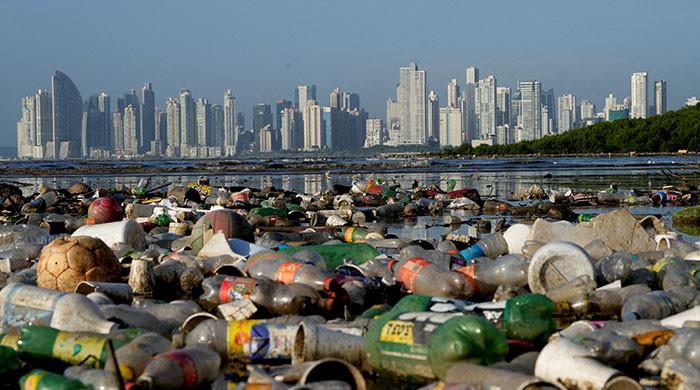
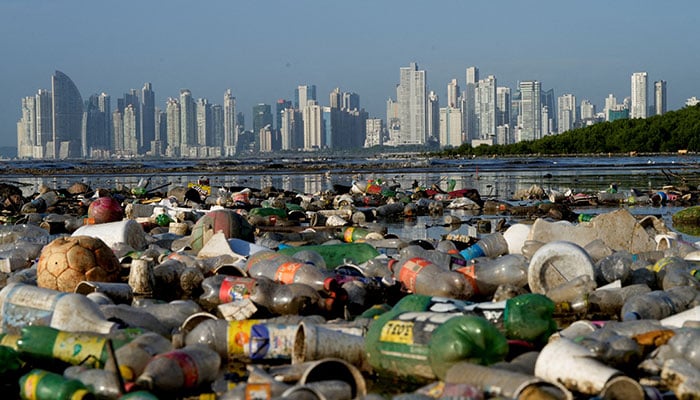
GENEVA: Delegates discussing the world’s first legally binding treaty to tackle plastic pollution failed to reach consensus, with diplomats voicing disappointment and even rage that the 10-day talks produced no deal.
Participants had been seeking a breakthrough in the deadlocked United Nations’ talks in Geneva, but states pushing for an ambitious treaty said that the latest text released overnight failed to meet their expectations.
The chair of the negotiations, Ecuador’s Luis Vayas Valdivieso adjourned the session with a pledge to resume talks at an undetermined later date, drawing weak applause from exhausted delegates who had worked into the early hours.
French ecology minister Agnes Pannier-Runacher told the meeting’s closing session that she was “enraged because despite genuine efforts by many, and real progress in discussions, no tangible results have been obtained”.
In an apparent reference to oil-producing nations, Colombia’s delegate Haendel Rodriguez said a deal had been “blocked by a small number of states who simply did not want an agreement”.
Diplomats and climate advocates had warned earlier this month that efforts by the European Union and small island states to cap virgin plastic production — fuelled by petroleum, coal and gas — faced opposition from petrochemical-producing countries and the US under President Donald Trump.
US delegate John Thompson from the State Department declined to comment as he left the talks.
The path forward for the negotiations is uncertain.
UN officials and some countries, including Britain, said that negotiations should resume but others described a broken process.
“It is very clear that the current process will not work,” South Africa’s delegate said.
More than 1,000 delegates have gathered in Geneva for the sixth round of talks, after a meeting of the Intergovernmental Negotiating Committee (INC) in South Korea late last year ended without a deal.
Negotiations had gone into overtime on Thursday as countries scrambled to bridge deep divisions over the extent of future curbs. Many, including Danish environment minister Magnus Heunicke, who negotiated on behalf of the EU, were disappointed that the final push did not yield any results.
“Of course, we cannot hide that it is tragic and deeply disappointing to see some countries trying to block an agreement,” he told reporters while vowing to keep working on the treaty necessary to tackle “one of the biggest pollution problems we have on earth”.
Inger Andersen, Executive Director of the UN Environment Programme, also pledged to continue work. “We did not get where we want but people want a deal,” she said.
The most divisive issues include capping production, managing plastic products and chemicals of concern, and financing to help developing countries implement the treaty.
Anti-plastics campaigners voiced disappointment at the outcome but welcomed states’ rejection of a weak deal that failed to place limits on plastics production. “No treaty is better than a bad treaty,” said Ana Rocha, Global Plastics Policy Director from environmental group GAIA.
Politics
India’s Modi faces tough Bihar state election
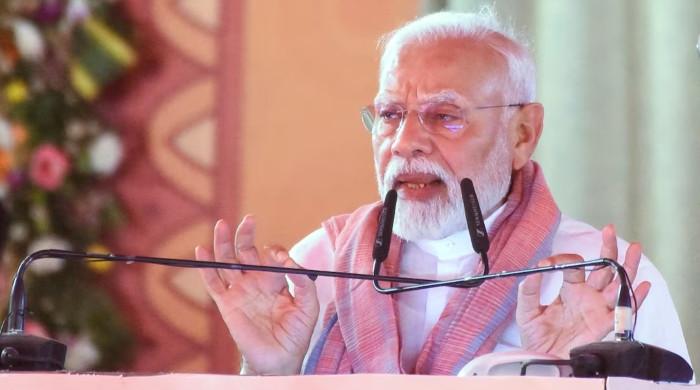
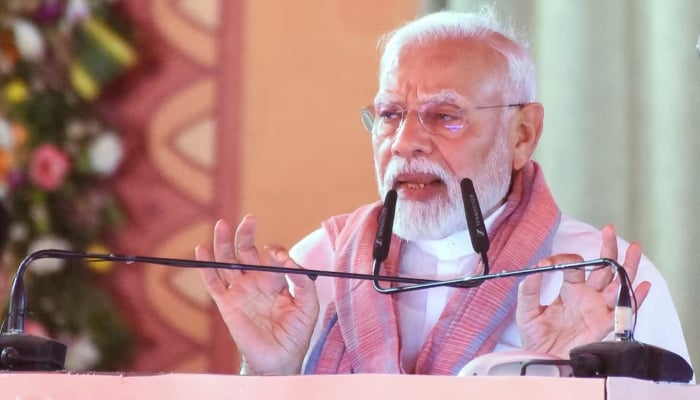
- Bihar election crucial for Modi’s coalition stability.
- Women voters pivotal due to male migration for jobs.
- Youth unemployment remains a key concern despite improvements.
PATNA: Indian Prime Minister Narendra Modi’s national alliance faces a tough regional election in the state of Bihar next month, due to youth unemployment and distrust over voter rolls, which could pose risks to his coalition that relies on regional partners.
Bihar, in eastern India, is one of the country’s poorest states and its third most populous, with over 130 million people. Its chief minister Nitish Kumar has previously sided with both Modi and the opposition, but is currently a key partner in Modi’s National Democratic Alliance.
The state is part of a politically crucial heartland region, and any cracks within the NDA in November’s assembly vote in Bihar could threaten Modi’s coalition, with elections to follow within months in the states of Assam, West Bengal, and Tamil Nadu. Modi’s national alliance, which has 293 out of 543 seats in the Parliament, has a strong voter base only in Assam.
Women are a key voting bloc in tight poll
The Vote Vibe agency said its opinion poll in Bihar showed the NDA had a marginal 1.6 percentage point lead over the opposition alliance, led by the Rashtriya Janata Dal and the Congress party as of October 8.
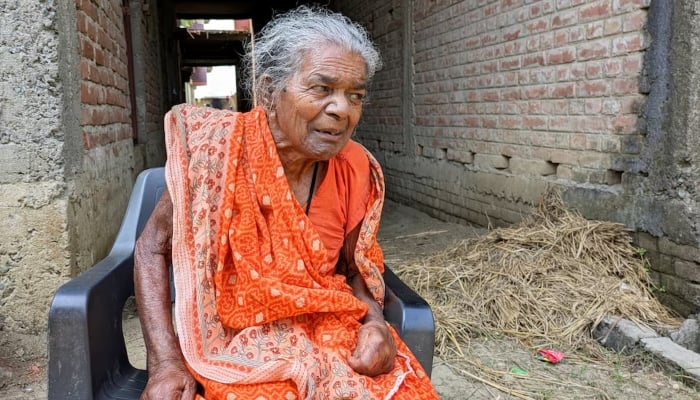
“This election could swing either way,” the agency said in its outlook, noting that the NDA’s slight edge was due to its recent programmes, such as money transfers to 12.1 million women under a self-employment subsidy that totalled more than 121 billion rupees ($1.37 billion).
Nivedita Jha, an activist based in Bihar’s state capital Patna, said women will form a strong voting bloc in the poll because men usually leave Bihar in search of jobs in economic hubs like Mumbai and New Delhi and not all return to vote.
“Women take the decisions because the men are not here,” she said. “They talk about the opposition which has promised more money if they come to power, and my understanding is that they trust the opposition more”.
Some Bihar voters are also angry about the revision of the state voter list. In one case, 85-year-old Jitni Devi said she was removed from the list and can no longer vote or access her pension.
“They have declared me dead,” she told Reuters. “People in my village tease me as a dead woman, and bank officials shoo me away when I go there to withdraw my money.”
The state election commission did not respond to queries about Devi’s case. The federal election body has previously said that all complaints are investigated thoroughly.
Young voters angry over unemployment
Anxiety among young voters in Bihar over employment is another election issue, despite a falling unemployment rate.
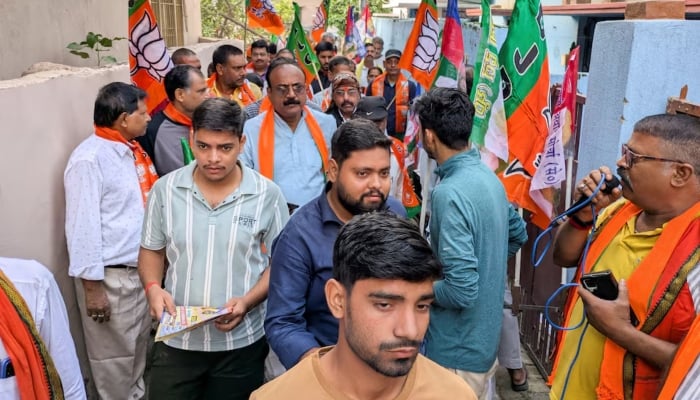
Government data showed that 9.9% of people aged 15–29 were unemployed in Bihar in the fiscal year 2023–24, a significant drop from 30.9% in 2018–19, but concerns persist.
“For me, I have seen my father going out of Bihar for work, so the issue of jobs matters the most,” said Babloo Kumar, 25, who plans to vote for the first time in November.
A new political party, Jan Suraaj — founded by Prashant Kishor, Modi’s former poll manager — said it aims to reset the political agenda in Bihar.
“Joblessness, migration, increasing debts, loss in agriculture revenue are the issues in Bihar,” said the party’s national president Uday Singh. “There is a big dip in Modi’s popularity here”.
The opposition has promised a law guaranteeing at least one government job per family, if desired.
Modi’s Bharatiya Janata Party, however, said it remains confident of victory.
“The NDA alliance is in a very solid position,” said Guru Prakash Paswan, a BJP spokesperson. “People have strong faith in Prime Minister Narendra Modi’s vision”.
Voting will be held on November 6 and 11 for 243 state assembly seats, and results will be declared on November 14.
Politics
India’s pollution refugees fleeing Delhi’s toxic air
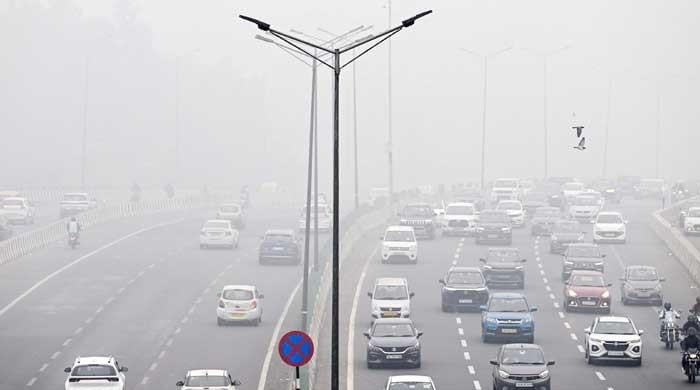
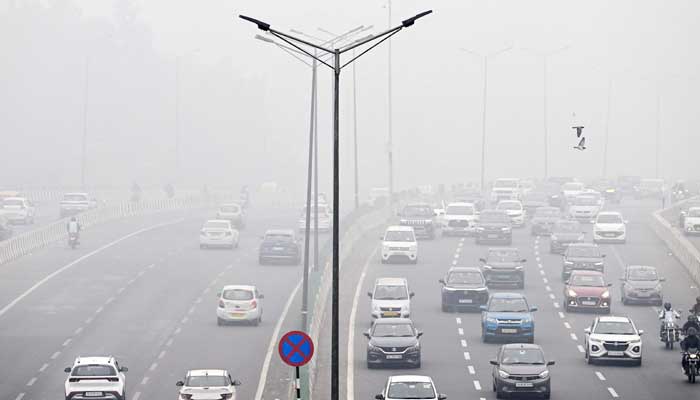
- Families leaving Delhi because of health risks linked to air pollution.
- Levels of cancer causing PM2.5 surge 60 times of WHO limits.
- 3.8m deaths in India from 2009 to 2019 linked to air pollution: study
BENGALURU: Pollution levels in India’s capital shaped Natasha Uppal and her husband’s decision on parenthood — either raise their child away from the city, or stay put and remain childless.
New Delhi and the surrounding metropolitan area, home to more than 30 million people, consistently tops world rankings for air pollution.
Uppal, who grew up in the city, often considered leaving — especially on days spent indoors with air purifiers humming, or when she battled severe migraines.
The turning point came when the couple decided to try for a baby.
“When we thought about what we can curate for our child in Delhi,” she told AFP, “the air just became such a blocker for so many of those things”.
In 2022, they relocated to Bengaluru and, days later, she discovered she was pregnant.

They are among a small but growing number of families leaving Delhi because of health risks linked to air pollution.
Uppal, the 36-year-old founder of maternal health support group Matrescence India, said leaving was the “best decision”.
Air pollution in Bengaluru can still sometimes hit three times World Health Organisation (WHO) limits.
But that is far below Delhi’s months-long haze — and means her son “is in and out of the house as many times as he likes”.
Clean air is “something that is a basic human right”, she said. “Everyone should be able to take [it] for granted”.
3.8 million deaths
Each winter, Delhi is blanketed in acrid smog, a toxic mix of crop-burning, factory emissions and choking traffic.
Levels of PM2.5 — cancer-causing microparticles small enough to enter the bloodstream — have surged to as much as 60 times WHO limits.
Despite pledges of reform, measures such as partial vehicle bans or water trucks spraying mist have done little to clear the air.
This year, authorities promise cloud-seeding trials to cut pollution.
A study in The Lancet Planetary Health last year estimated 3.8 million deaths in India between 2009 and 2019 were linked to air pollution.

The UN children’s agency warns that polluted air puts children at heightened risk of acute respiratory infections.
For Vidushi Malhotra, 36, the breaking point came in 2020 as her two-year-old son fell ill repeatedly.
“We had three air purifiers running continuously, and then I needed more,” she said.
A year later, Malhotra, her husband and son moved to Goa. She urged friends to follow, starting what she calls a “mini-movement”. A few did.
“I have to keep going back and see my loved ones go through this,” she added. “That really makes me sad.”
Nebulisers, inhalers
Others, like Delhi resident Roli Shrivastava, remain but live in constant anxiety.
The 34-year-old keeps inhalers for her smoke allegies and nebulisers ready for her toddler, whose cough worsens each winter.
“The doctor told us winter will be difficult,” she said. “He just told us, ‘When your kid starts coughing at night, don’t even call me — just start nebulising’.”

As winter nears, Shrivastava is preparing for another season indoors — restricting outdoor play for her son, running air purifiers and checking air quality daily.
When the family visits relatives in the southern city of Chennai, her son’s health improves “drastically”.
“His nose stops running, his cough goes away,” she said.
Shrivastava and her husband, who both work with a global advocacy group, say they would have left Delhi long ago if not for the “jobs we love and the opportunities”.
Relocation, she admits, is never far from their minds.
“I don’t think at the rate it’s going, Delhi is a good place to raise kids — when it comes to air pollution at least.”
Politics
Pentagon journalists vacate workspace as new restrictions take effect


- DoD had asked reporters to acknowledge restrictions or lose access.
- Some 30 news outlets return press credentials at Pentagon.
- Many journalists declined to sign new policy.
Dozens of journalists who cover the US Defense Department (DoD) vacated their offices in the Pentagon and returned their credentials on Wednesday as new restrictions on press access took effect.
The defense department had set a Tuesday deadline for news outlets to either sign a new Pentagon access policy or lose access to press credentials and Pentagon workspaces.
At least 30 news organisations, including Reuters, declined to sign the new policy, citing a threat to press freedoms and their ability to conduct independent newsgathering on the world’s most powerful military.
The policy requires journalists to acknowledge new rules on press access, including that they could be branded security risks and have their Pentagon press badges revoked if they ask department employees to disclose classified and some types of unclassified information.
The Pentagon Press Association, which represents more than 100 news organisations, including Reuters, said in a statement that Wednesday was “a dark day for press freedom that raises concerns about a weakening US commitment to transparency in governance, to public accountability at the Pentagon and to free speech for all.”
Chief Pentagon spokesperson Sean Parnell said in a statement on Monday: “The policy does not ask for them to agree, just to acknowledge that they understand what our policy is. This has caused reporters to have a full-blown meltdown, crying victim online. We stand by our policy because it’s what’s best for our troops and the national security of this country.”
The Pentagon declined to make additional comment on Wednesday.
Journalists described the press area at the Pentagon on Wednesday as unusually quiet, as they removed furniture, computer servers, TV studio soundproofing material and other contents.
“I’ve never seen that place not buzzing like a beehive,” said JJ Green, National Security Correspondent at Washington news radio station WTOP.
Green, who has worked as a national security correspondent for 20 years, turned in his press credential Wednesday morning. Television outlets have until Friday to remove their gear.
Credentialed reporters have traditionally been limited to unclassified spaces in the Pentagon and have worked across the hallway from the Pentagon press office, which has allowed them access to department spokespeople. Press badges signify that they have gone through a background check.
“We’ve never been allowed to just bolt right on into classified areas or people’s offices,” said Stephen Losey, a reporter who covers the Air Force for Defense News. “I don’t know anybody who would purposely eavesdrop or anything like that, which is what some people have made it seem like we’re doing.”
Some journalists interviewed by Reuters said the new restrictions won’t keep them from reporting on the US military.
“The irony of irony is that Pentagon reporters are not having conversations about controlled information in the hallways,” said a member of the Pentagon Press Association speaking on condition of anonymity. “We’re doing it over (the encrypted app) Signal.”
The Pentagon’s new policy is the latest expansion of restrictions on press access under Defense Secretary Pete Hegseth, a former Fox News host. Fox News is among the news organisations that have refused to sign on to the new press restrictions.
-

 Business1 week ago
Business1 week agoTata Capital IPO: Rs 15,512 crore IPO fully subscribed; stock market debut on Oct 13 – The Times of India
-

 Tech7 days ago
Tech7 days agoApple Took Down ICE-Tracking Apps. Their Developers Aren’t Giving Up
-

 Tech6 days ago
Tech6 days agoMen Are Betting on WNBA Players’ Menstrual Cycles
-

 Tech1 week ago
Tech1 week agoAnthropic to open India office as AI demand grows
-

 Tech1 week ago
Tech1 week agoMy Favorite Affordable 360 Rotating Pet Camera Is on Sale Right Now
-

 Tech1 week ago
Tech1 week agoSHIELD activated: Researchers build defense to protect drones from cyberattacks
-

 Tech1 week ago
Tech1 week agoIT Sustainability Think Tank: Don’t believe Big Tech’s green IT hype | Computer Weekly
-

 Tech1 week ago
Tech1 week agoAs long as the cybercriminals’ business model works, companies are vulnerable to attack






